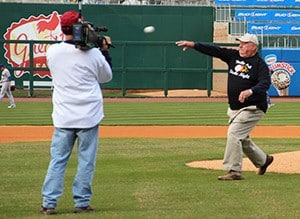Survivors Strike Out Stroke, Raise Awareness
June 18, 2013 | Even before the games began, baseball fans in North Little Rock and Northwest Arkansas got to see the final results of victory as stroke survivors moved into action and threw several ceremonial first pitches. The stroke survivors threw their strikes against stroke at the AR SAVES Strike Out Stroke night June 13 at Dickey-Stephens Park in North Little Rock before an Arkansas Travelers game against the Tulsa Drillers. On April 4, survivors did the same at Arvest Park in Springdale before a game pitting the Northwest Arkansas Naturals against the Midland Rockhounds. “Our Strike Out Stroke events are a complete success across the state,” said Michael Manley, director of the Arkansas Stroke Assistance through Virtual Emergency Support (AR SAVES). “Not only are they done at the local community level, but our partnerships with the Arkansas Travelers and the Northwest Arkansas Naturals are critical to reaching a larger audience about the signs and symptoms of stroke.” The AR SAVES program is a partnership between the UAMS Center for Distance Health, the state Department of Human Services, Sparks Regional Health System in Fort Smith, and 41 Arkansas hospitals. The program uses a high-speed video communications system to help provide immediate, life-saving treatments to stroke patients 24 hours a day. The real-time video communication enables a stroke neurologist to evaluate whether emergency room physicians should use a powerful blood thinner within the critical 4.5-hour period following the first signs of stroke. Robert Scott, M.D., a physician practicing in Dumas and Gould, was one of the many patients who have received the blood thinner after a videoconference consultation. “Once that was done, an hour later, I was back,” Scott said in February. “At this point, I have no known deficits.” He even was well enough to be one of the ceremonial pitchers before the Travelers game. In addition to Scott, AR SAVES stroke survivors who pitched at Dickey-Stephens were Ticia Covington, Marica Griffith and Steve Osemota. Jerry Leonard, also a survivor, along with Ben “Coach” Wade of the “Survivor” television program on CBS pitched strikes for stroke at Arvest Park in April. Helicopters delivered the baseballs to each field for the survivors to use. Volunteers from AR SAVES sites around the state worked at stroke education booths at the ballparks to distribute informational materials and answer questions, and brain-shaped stress toys were thrown into the stands. Arkansas, which ranks first in the nation in stroke death rates, had 1,741 stroke-related deaths in 2010, according to the national Centers for Disease Control and Prevention. Since the program began Nov. 1, 2008, more than 1,642 patients have received stroke consults through AR SAVES and more than 400 patients have received blood-clot busting drug treatment. “These two events really put us over the top in the number of contacts it allows us to expose our message to about stroke,” Manley said. “Not only do we reach the fans that are there, but also those who listen by radio as well as the news coverage we receive. It’s priceless and a real home run for our program and the people we serve.” |


